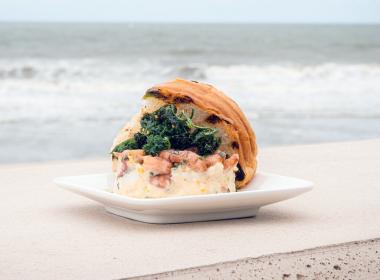THE ANNUAL NATIONAL FOODSERVICE CONGRESS IS AN IMPORTANT EVENT AT WHICH THE LATEST FOOD SERVICE TRENDS AND DEVELOPMENTS ARE DISCUSSED AND VARIOUS GUEST SPEAKERS COME TO SHARE THEIR VISION AND INSIGHTS WITH PROFESSIONALS FROM THE SECTOR.
WE WERE ALSO PRESENT AT THIS CONGRESS WITH COMPASS GROUP BELGIUM. RANGING FROM THE IMPACT OF THE CORONA CRISIS TO NEW TECHNOLOGICAL INNOVATIONS, HERE ARE SOME KEY INSIGHTS WE LEARNED FROM THE LECTURES.

CORONA HAS HAD AN IMPACT ON THE SECTOR..., BUT ALSO FORCED COMPANIES TO INNOVATE

There is no denying that the corona crisis has taken its toll on the Belgian food service sector. The Belgian government set up a support package of no less than €835 million, a measure that was welcome but which ultimately proved to be largely inadequate. Nevertheless, this government support was appreciated by the sector, as were the temporary reduction in VAT in the hotel and catering industry and the intervention for a thirteenth month. A wave of bankruptcies is likely despite these support measures, and economic forecasts remain unpredictable despite the vaccines. Menu prices also rose sharply after the crisis, with fluctuating commodities and inflation also playing a role.
However, the corona measures and the lock-down of the sector also forced most companies to be creative and to evolve more quickly. New concepts and technological innovations were implemented at an accelerated pace. A clear example of this is the digital menu, whereby customers can conjure up the menu of a restaurant or café on their smartphone by scanning a QR code. Simple, efficient and coronaproof, because no more menus need to be passed around. So many companies have taken advantage of the corona crisis to start improving themselves in depth.
Food delivery is hot!

Not a surprising development. The lockdowns and corona measures have prompted us all to order food online en masse. It is striking that the range of products on offer is constantly expanding and that so-called exotic fast food (such as sushi) is very popular. In addition, competition in the food delivery sector is fierce, and companies are competing with each other in terms of both quality of meal and delivery time.
VALUE CREATION IS BECOMING INCREASINGLY IMPORTANT

Contrary to what was expected after the crisis, everything in the market is now shifting towards average prices with high functionality. Customer is king, and people are looking for experience nowadays. Value creation ensures customer satisfaction and a better relationship between price and customer benefits. This in turn leads to customer loyalty and a larger market share. In short, those who know how to distinguish themselves from the competition through a unique concept or certain benefits for the customer, have an edge on the rest! A low price alone will not get you there!
BOTH HEALTHY AND SUSTAINABLE FOOD ARE GAINING POPULARITY

An important consumption trend that continues. Green food continues to gain importance; healthy food, plant-based food, plant-forward diets, sustainable food, and so on.... At the same time, we see that food companies are paying more and more attention to a broader sustainability perspective, and we see, for example, the rise of sustainable packaging and zero waste objectives. Interestingly, there is also a counter-movement going on, and fast food in parallel with healthy food is on the rise again.
THE WAR FOR TALENT IS FULLY ON, AND THERE ARE SIGNIFICANT EMPLOYMENT CHALLENGES IN THE industry

Due to the corona crisis, there were many redundancies in the sector. As the food industry is slowly but surely recovering from this crisis, there is a high demand for new personnel in the sector. At the same time, there is a change in mentality among young people who want to work in the food service sector. Money is considered less important than a good work-life balance, and the latter is not always associated with the life of a chef or kitchen staff. It is up to the foodservice sector to meet these new demands and at the same time to reverse the sometimes negative media coverage of how the industry treats its staff.
FOOD TECH COMPANIES ARE ON THE RISE

The food service industry remains a highly competitive business. Companies are constantly looking for new ways to reinvent themselves, and in the wake of lockdowns and corona measures, many food companies have embraced the lightning-fast development of technology in order to keep reaching old customers or tap into new markets. This leads to food tech companies entering the market as new players. These companies mainly sell food technology and smart innovations. An example of this is the smart fridge as a replacement of the classic company restaurant, where scanning a QR code gives you access to a fridge full of warm-up meals and an app then tracks your spending.
BIG DATA WILL PLAY A PROMINENT ROLE IN THE FUTURE

Data analysis will become increasingly important at all levels for food service companies. For example, supply can be data-driven, operations can be improved through analysis, the freshness of products can be guaranteed through data... Companies that collect data in-house and have the tools to interpret this data and translate it into their business philosophy will be the most successful. After all, knowledge of the algorithm is power. Data-driven menus are therefore no longer a distant prospect.



